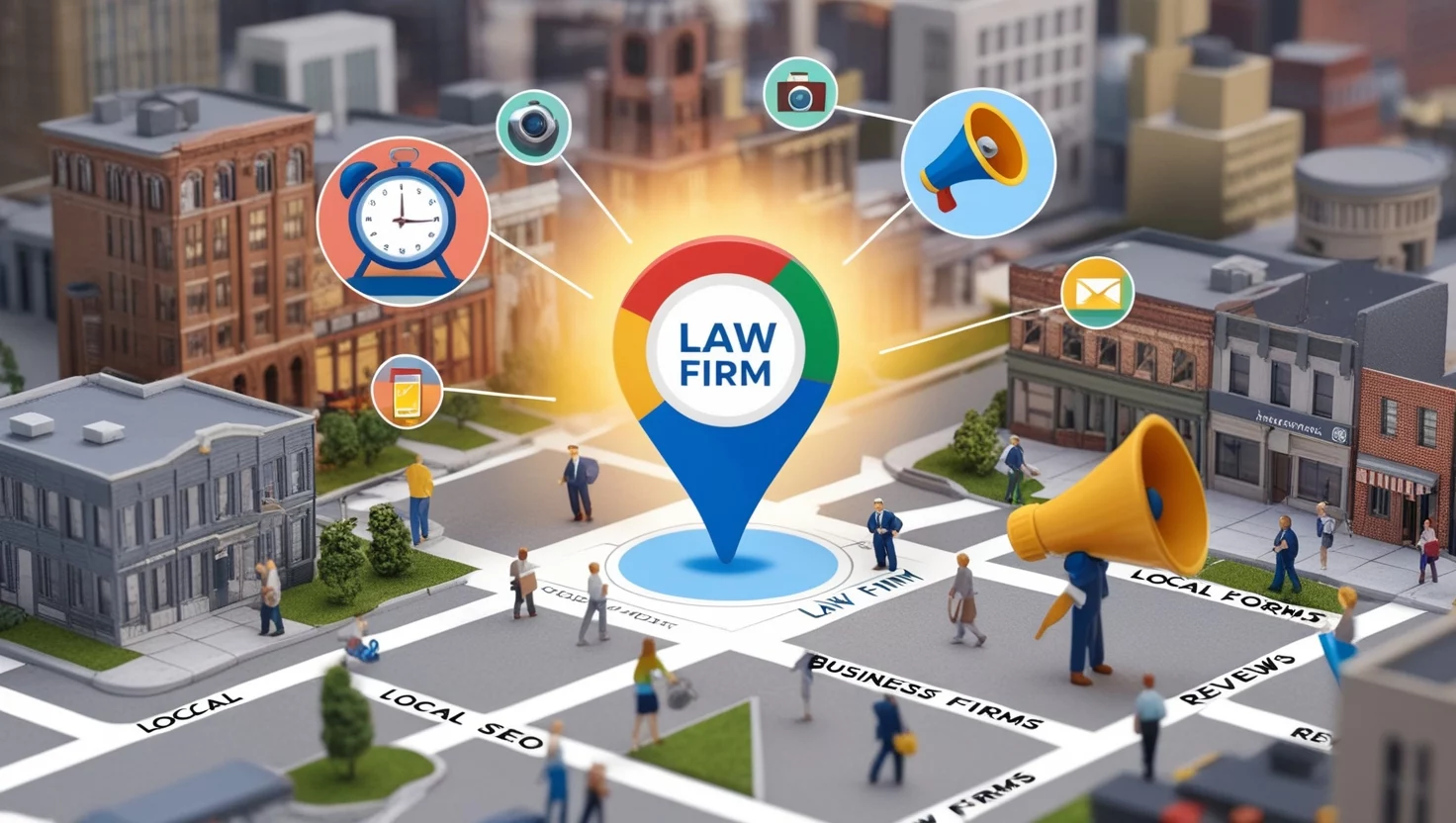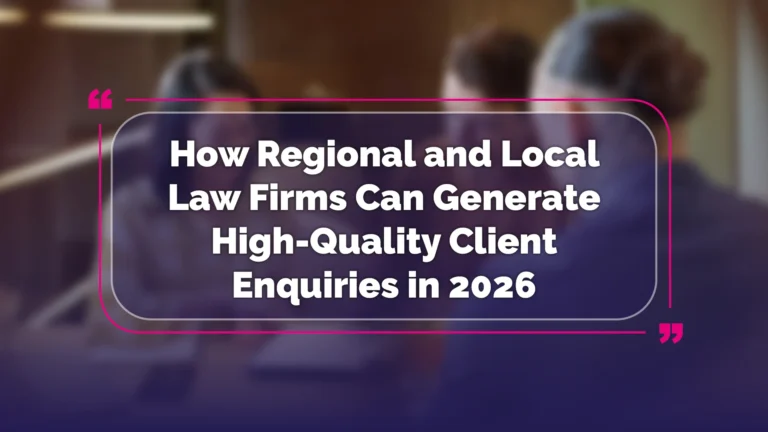By focusing on a specialised area of family law and implementing a strategic SEO plan, small and medium-sized law firms can enhance their online visibility, attract more client enquiries, and effectively compete with larger, well-established firms.
Introduction
Small and medium-sized law firms often face significant challenges when competing against larger, well-established firms. One major issue is that they often spread their efforts thin, trying to compete in every area of law. However, focusing on one core area, such as family law, can enable a firm to become local experts and gain a competitive edge. The dominance of big players can overshadow smaller firms, making it difficult for them to achieve online visibility and attract new clients. However, with a strategic and comprehensive approach to search engine optimisation (SEO), small law firms can level the playing field and effectively compete for web traffic and client enquiries.
Key Takeaways
- Specialisation is key: Focusing on niche areas, such as family law, can help small firms stand out and build authority.
- Technical SEO matters: Optimising site structure, speed, and user experience significantly impacts rankings.
- Long-tail keywords: These targeted keywords are less competitive and more effective for attracting specific client searches.
- Local SEO is vital: Optimising your Google My Business profile and gathering client reviews can boost visibility in local search results.
This guide aims to provide legal professionals with practical and actionable strategies to enhance their online presence, improve search engine rankings, and ultimately increase website enquiries. By focusing on core business areas, optimising law firm website functionality, and leveraging content creation and local SEO, small family law firms can build a robust online presence that rivals even the largest competitors. Search engine optimization is a key strategy for improving online presence and attracting


Laying the Foundation: Website Housekeeping
Ensuring Website Functionality and User Experience
A successful SEO strategy starts with a well-functioning, user-friendly law firm’s website. For a family law firm, this means creating a site that provides a seamless experience for visitors seeking information on sensitive topics like divorce, child custody, and adoption.
- Mobile Responsiveness: Ensure the website is fully responsive and performs well on all devices. Many potential clients will access your site via smartphones and tablets.
- Loading Speed: Optimise images, use efficient coding practices, and leverage content delivery networks (CDNs) to reduce loading times.
- User Experience: Design a clean, professional layout with intuitive navigation. Clear, well-organised content areas for services like divorce, child custody, and adoption can help users find the information they need quickly.
Eliminating Technical Errors: Technical SEO
Technical issues can severely impact a website’s SEO performance. Conduct regular audits to identify and fix any errors that might hinder your site’s performance.
- Broken Links: Use tools like Google Search Console to find and fix broken links.
- XML Sitemaps: Ensure your sitemap is up-to-date and correctly submitted to search engines.
- HTTPS Security: Implement HTTPS to secure your website, which is crucial for maintaining user trust and improving SEO rankings.
- Site Structure: A well-organized site structure is essential for technical SEO. It impacts search engine rankings and influences Google’s ability to crawl and index web pages effectively. A flat site structure can facilitate easier crawling and better SEO performance.
Improving Site Navigation and Structure
An easy-to-navigate site not only improves user experience but also helps search engines crawl and index your content effectively. On-site SEO, including optimizing title tags with the target keyword and creating long-form content that covers the target topic comprehensively, is crucial for improving your site’s visibility.
- Clear Menu Structure: Create a straightforward menu with links to key areas such as divorce, child custody, adoption, and other family law services.
- Internal Linking: Use internal links to connect related content. This helps keep users on your site longer and signals to search engines which pages are most important.
- Breadcrumbs: Implement breadcrumb navigation to help users understand their location on the site and easily navigate back to previous pages.


Defining Your Niche: Focusing on Core Business Areas
The Benefits of Specialisation for Small Law Firms
Specialising in a specific area of family law can set your firm apart from generalists and large firms with multiple practice areas. By becoming an expert in a niche, you can attract clients looking for specialised knowledge and build a reputation as a leader in that field.
How to Identify Your Firm’s Core Area of Expertise
Evaluate your firm’s strengths, past cases, and client needs to identify a niche within family law where you can excel. This could be high-conflict divorce cases, international child custody disputes, or collaborative divorce for business owners.
Aligning Your Online Presence with Your Specialisation
Once you’ve identified your niche, ensure that your website and online content reflect this specialisation.
- Dedicated Pages: Create dedicated service pages for each specialised area, such as “High-Conflict Divorce” or “International Child Custody.”
- Blog Content: Regularly publish blog posts and articles that address common questions and concerns related to your niche.
- Client Testimonials: Showcase testimonials from clients who have benefited from your specialised services.


Keyword Strategy: Long Tail vs. Short Tail Keywords
Understanding the Difference Between Long Tail and Short Tail Keywords
Keywords are the foundation of SEO. Short tail keywords are broad and highly competitive (e.g., “divorce lawyer”), while long tail keywords are more specific and less competitive (e.g., “collaborative divorce solicitor for business owners”).
How to Conduct Keyword Research and Select Appropriate Keywords for Your Firm
Use tools like Google Keyword Planner, Ahrefs, and SEMrush to find keywords relevant to your niche. Focus on long tail keywords that reflect the specific services you offer and the issues your clients face. Search engine marketing includes both SEO and PPC activities aimed at driving traffic.
- Keyword Difficulty: Choose keywords with lower competition but significant search volume.
- User Intent: Select keywords that align with the intent of potential clients searching for family law services.
Implementing Keywords Across Your Website and Content
Once you’ve selected your keywords, strategically incorporate them into your website and content.
- Service Pages: Use primary keywords in titles, headings, and body text of service pages.
- Blog Posts: Write blog posts targeting long tail keywords and addressing specific client questions.
- Meta Tags: Optimise meta titles and descriptions with relevant keywords to improve click-through rates from search engine results pages (SERPs).


Content Creation: Establishing Authority and Relevance
Developing Helpful Guides and Resources
Creating comprehensive guides and resources can position your firm as an authority in family law. Achieving SEO success involves creating such in-depth content that not only informs but also attracts backlinks and improves user experience.
- Guides: Develop in-depth guides on topics like “A Guide to Co-Parenting After Divorce” or “Understanding Child Support Laws in [Your Region].”
- Ebooks: Offer downloadable ebooks that provide valuable information on complex issues like divorce settlements or child custody arrangements.
Addressing Frequently Asked Questions
FAQ sections and blog posts that answer common questions can drive traffic to your site and build trust with potential clients.
- FAQs: Create a dedicated FAQ page covering topics like “What are the steps in a divorce process?” or “How is child custody determined?”
- Blog Posts: Regularly publish blog posts that delve deeper into these questions and provide detailed answers.
Reporting on News and Changes in Legislation Relevant to Your Core Business Area
Stay current with changes in family law and share updates with your audience.
- News Articles: Write articles on recent legislative changes and how they impact family law cases.
- Opinion Pieces: Provide expert analysis and opinions on news stories related to your niche.


Local SEO: Optimising Your Google My Business Profile for Local SEO
Importance of Local SEO for Law Firms
Local SEO is crucial for law firms, as most clients search for legal services within their geographic area. Optimising your Google My Business (GMB) profile can significantly improve your visibility in local search results. Ranking higher in local search results can significantly increase search engine traffic.
Key Elements of an Optimised GMB Profile
- Accurate Information: Ensure your GMB profile includes accurate and up-to-date information, such as your firm’s name, address, phone number, and business hours.
- Categories: Choose relevant categories like “Family Law Solicitor” to help potential clients find your services.
- Photos: Upload high-quality photos of your office, team, and any family law events or community activities you participate in.
Implementing a Review Management Strategy
Positive reviews can boost your firm’s credibility and improve your local search rankings.
- Encourage Reviews: Ask satisfied clients to leave reviews on your GMB profile.
- Respond to Reviews: Respond to all reviews, both positive and negative, in a professional and timely manner.
- Monitor Feedback: Use feedback from reviews to identify areas for improvement and enhance client satisfaction.


Marketing Campaigns: Showcasing Your Expertise
Creating Social Media Content
Social media platforms can amplify your reach and engage with potential clients.
- Content Types: Share informative posts, client success stories, and updates on family law topics.
- Platforms: Focus on platforms where your target audience is most active, such as Facebook, LinkedIn, and Instagram.
Designing Web and Email Banners
Web and email banners can highlight your services and specialisations while playing on locality and emotions.
- Web Banners: Place banners on your website promoting specific services, like “Your Trusted Local Family Solicitor – Schedule a Free Consultation Today.”
- Email Banners: Include banners in your email newsletters to advertise your latest blog posts, guides, or upcoming webinars with messages such as “Get Expert Advice from Your Local Family Law Experts.”
Producing Informative Videos
Videos can effectively communicate complex legal information and humanise your firm.
- Educational Videos: Create short videos explaining legal processes, such as “The Steps in a Divorce Case” or “How Child Custody is Decided.”
- Client Testimonials: Film testimonials from satisfied clients to build trust with potential clients.
Running Targeted Paid Advertising Campaigns
Paid advertising can drive targeted traffic to your website and generate enquiries.
- Google Ads: Run search ads targeting long tail keywords relevant to your services.
- Social Media Ads: Use Facebook and LinkedIn ads to reach users interested in family law topics.
Additionally, link building is an important off-page SEO strategy that can complement paid advertising efforts.
Setting Realistic Expectations and Timelines
Factors Affecting Ranking Improvements
Several factors influence how quickly you see improvements in your search rankings, including the competitiveness of your keywords, the quality of your content, and the effectiveness of your SEO strategies.
Using Google Analytics can help track and optimize organic traffic and understand user intent, which are crucial for improving search rankings.
Suggested Time Investment (10-15 Hours per Week)
To achieve noticeable results, dedicate 10-15 hours per week to your SEO efforts. This time should be spent on content creation, keyword research, technical SEO, and monitoring performance.
Expected Results Within a Six-Month Timeframe
While SEO is a long-term strategy, you can expect to see gradual improvements in your rankings and website enquiries within six months. Consistency and persistence are key to achieving sustained success.
Conclusion
In summary, small family law firms can compete with larger firms by implementing a comprehensive SEO strategy. By focusing on website functionality, specialising in niche areas, utilising long tail keywords, creating authoritative content, optimising for local SEO, and running targeted marketing campaigns, your firm can improve its online visibility and attract more enquiries.
Take action today and start implementing these tactics to elevate your firm’s online presence. With dedication and strategic effort, you can outrank the big players and grow your family law practice.
Looking to boost your firm’s visibility and generate more client enquiries? Discover our expert marketing services for law firms, tailored to drive growth through proven strategies and measurable results. Get started today!




